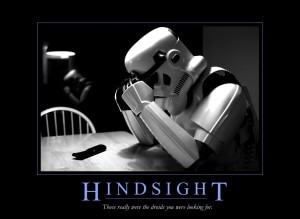 You’ve done this. You’re sitting in class as the professor passes out your graded multiple choice tests. You think you did pretty well on the test. When you get your test back, you see that you missed question 3. You re-read that question, and you see that your professor has circled the correct answer, and you had answered it wrong. D’oh! I knew that answer. Why did I mark “A”? I knew the answer was “C”. How did I get that wrong?
You’ve done this. You’re sitting in class as the professor passes out your graded multiple choice tests. You think you did pretty well on the test. When you get your test back, you see that you missed question 3. You re-read that question, and you see that your professor has circled the correct answer, and you had answered it wrong. D’oh! I knew that answer. Why did I mark “A”? I knew the answer was “C”. How did I get that wrong?
This is the hindsight bias. Once you’re told the correct answer, you can’t imagine how you ever missed it. You believe that you knew the correct answer even before you saw your professor’s mark, and express frustration that you marked the wrong one. You just can’t understand why you didn’t choose that answer when you took the test. You know the answer now and it seems as if you knew the answer before as well.
Here is the problem with the hindsight bias when it comes to studying for your bar exam. You see a question or an issue in your bar exam practice essay, and immediately, almost subconsciously think, “I know the answer to that” and then you just move on without giving it any more thought. The reason you believe that you know the answer, however, is that you have previously seen the correct answer. Once we have been told the correct answer, we tend to remember knowing the information, even if we currently do not recall the answer. That’s the problem: we can’t rely on remembering that we know something, and then skip it. We must continually test ourselves on the substantive answer to be sure we still know it.
This is particularly problematic when you’re doing “rough outlines” of answers to bar exam practice essays. If you get a little lazy, you’ll be skimming through your practice essays and spot an issue. You remember that you’ve recently written the relevant rule while doing a different essay. So you think, “I know this rule, I’m going to move on” and you don’t write out the rule as part of your answer outline. But if you took the time to truly think through the issue and write out the relevant rule, you might realize that you didn’t actually remember it or didn’t remember it as well as you thought. You just thought you remembered it.
The same is true for flashcard or quiz practice. It’s easy to look at the front side of your card, remember knowing the answer, and just move on to the next card. This is a bad strategy. Even if you think you are sure of the answer, you should still force yourself to recall the complete answer and then turn over the card to check yourself.
The Hindsight Bias likely developed as a shorthand way to keep us from having to constantly re-investigate things we already learned — it saves energy and therefore, has a biological basis. But like most human adaptation, it can also be a weakness. To work around it, we must become aware of it and force ourselves to re-answer the questions we think we already know.
I’ve written more on testing yourself using scientifically proven methods.
